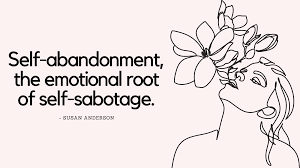Why does this happen? What can we do to keep ourselves aligned with sound practices and processes?
A reader recently reached out, explaining that he once in a while experiences losses that wipe out a large share of his monthly profits. It is frustrating to trade well most of the time, only to lose discipline and seemingly sabotage all we've accomplished. As the graphic above suggests, the root of self-sabotage is self-abandonment. We temporarily lose sight of what we're meant to do and instead act on impulse. In the terms of the Radical Renewal online book, we abandon the soul of what we do and allow our trading to become ego-driven.
I have never been convinced that the root of such self-sabotage is a deep-seated, inner desire to hurt oneself. It is usually not an absence of self-esteem that causes us to become reactive. Rather, we experience "triggers" that set off automatic and often harmful actions. The problem is a temporary loss of free will. Under a certain set of emotional and physical conditions, we behave in pre-programmed ways and become reactive rather than active. Quite literally, it is a loss of self-awareness that allows us to behave in ways that harm our best interests.
Consider the many situations in which we *never* go on tilt and behave reactively and self-destructively. We're not careful in crossing busy streets 99% of the time, only to occasionally walk directly in front of traffic. We don't operate machinery (lawn mowers, ovens) safely most of the time, only to occasionally cut or burn ourselves severely. Why don't we go on tilt in those situations? Reason one is that our egos are not involved, and reason two is that we are supremely aware of the dangers at hand. If I don't *need* to cross the road quickly and I'm mindful of the busy traffic, I am perfectly able to wait for a break in the flow of cars to cross safely. If I'm clearly aware of danger, I will act with caution. Always.
This is where it's helpful to engage in a "check up from the neck up" prior to any risk taking. If a surgeon is scheduled for a procedure, but is in an agitated state because of a personal circumstance, that surgeon will delay the operation. "Above all else do no harm" is the operative principle. If a pilot is about to take off for a flight, they reach out to the co-pilot and--together--go through the pre-flight checklist to make sure the plane is truly air-worthy. If something is wrong mechanically, the flight will be delayed. Above all else, do no harm.
The opposite of self-abandonment is self-awareness. If we approach each session of trading--each trade!--the way a surgeon approaches an operation or the way in which a pilot preps for a flight, then we are in the state we're normally in when we're crossing a busy street. The awareness of risk and danger enables us to do no harm. It isn't discipline or "process" orientation that enables us to not go on tilt when we're handling a carving knife in the kitchen. It's the immediate, acute awareness of danger. The key is self-awareness: knowing when we're in the wrong mindset for risk-taking. Like the surgeon, like the pilot, we must take danger so seriously that we're willing to postpone our performance until we're assured that we will "do no harm". If we've performed our own checkup from the neck up, we're not going to trade on impulse.
Further Readings:
Radical Renewal and the Spirituality of Trading
.



